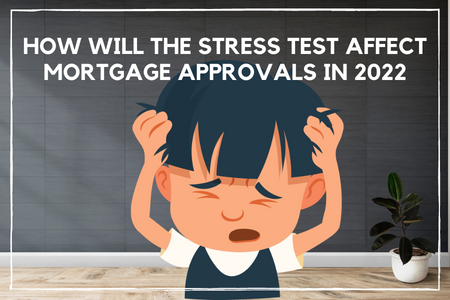Welcome To Our Mortgage Educational Blog About:
How will the stress test affect mortgage approvals in 2022?

Owning a home is a dream many people wish to attain. Not only does it provide a way to preserve future wealth, but it is also economical compared to the cost of renting.
The factors that contribute to the upheavals in the real estate market are a handful but the most discernible today is the fluctuating interest rates.
Canada’s stress test was much needed with our extremely low interest rates. With rates rising it’s time for our government to reconsider the stress test. To get a better understanding of the stress test, let’s first look at…
What is a Mortgage Stress Test?
In 2018, the government adopted the mortgage stress test with the hope of mitigating the mortgage default risk as well as the myriad of risks that come with the housing market.
The stress test served as a qualifying benchmark. Up to now, it is still being used to determine whether buyers like you will be able to pay their mortgage in the event interest rates rise.
The rate of the mortgage stress test is higher in comparison to the actual lending rate that would be given by a financial institution. The reason behind this is to ensure that you can afford any potential increase in the costs of mortgage.
This is how it works.
Your mortgage provider has rules and guidelines to determine if you are eligible for a mortgage, and the amount you can borrow.
Your provider will be required to determine what you can afford using two major calculations:
The Gross Debt Service (GDS) ratio is first used. This is the percentage of the pre-tax income you can use to pay for housing costs which includes the mortgage payment, property taxes, heat and half of your condo fees (if applicable). It should not exceed 39% of your pre-tax income.
The Total Debt Service (TDS) ratio is then used which includes the mortgage payment, property taxes, heat, half of your condo fees (if applicable) and all of your outstanding personal debt (credit cards, lines of credit, car loans, etc.). It should not be more than 44% of your pre-tax income.
To be approved for a mortgage with the stress test, you’d need to prove that you could afford to pay the higher amount of:
- 5.25% which is the Benchmark Rate
- 2% over the offered rate by your mortgage provider
Reviews on the mortgage stress test
The minimum qualifying rates for uninsured mortgages are the higher of 5.25% or the approved contractual mortgage rate plus 2%. What this means is that if your lender offers you a rate of say 3%, you will have to use the 5.25% qualifying rate in your stress test. If you are offered a rate of 3.5%, it implies that you will have to qualify using a rate of 5.5%.
Even though the new mortgage qualifying rate is meant to protect the housing market, the changes also imply that you might need to settle for a downgraded budget or put a larger down payment on your mortgage.
Let’s break it down:
Say for instance you want to apply for a mortgage of $500,000 at a 5-year fixed rate of 4.59% and an amortization of 25 years. Your financial institution will assess your affordability on the higher of:
- 6.59% (4.59% + 2%)
- 5.25 qualifying rate
In such an instance (5-year fixed rate of 4.59%), the rate used to decide on the amount of loan that you would be able to qualify for a home purchase is 6.59%, regardless of the fact that this is not the rate you would have to pay on your mortgage.
This, without a doubt, decreases the mortgage amount you can get. In this case, the $500,000 you had originally planned will not be granted; you would have to settle for less.
Let’s put this into better context.
If the stress test was not in place today (August 4, 2022), you would be approved for a mortgage on a $500,000 home with an income of $100,000 and a downpayment of $50,000. With the stress test, you would not be approved for the same mortgage.
How does this impact me with interest rates rising?
Now that the prime rate is steadily increasing, the stress test needs to be reviewed by our government once again. With mortgage rates in Canada hovering around 5%, you will now need to be approved at a mortgage rate of around 7%. And mortgage rates are still expected to go up. This is unfair to most Canadians living outside of the hyper inflated markets, which the stress test was introduced to cool those markets down. This makes home ownership almost impossible for many young home buyers and new home buyers who are entering the market. Let’s do a quick example of what you need to make to purchase a home in Edmonton with the current stress test and mortgage rates.
- Edmonton’s average sold price is roughly $385,000 as of May.
- Edmonton’s average household income is $98,000 for a family, and $55,000 for an individual.
- An individual with no debts will not be approved for a mortgage unless they have a down payment of at least 51%
- A family with no debts would be approved for a mortgage with payment of at least 5%
How to improve your stress test results
- You can increase the amount of your down payment by saving up more. This will help reduce your monthly mortgage payment as well as your TDS and GDS ratios
- Having a co-signer or guarantor can also help – bringing more income to the application.
- Finally, you can ensure that you have cleared any outstanding debts before you apply for a mortgage
Conclusion
The main purpose of the stress test is to aid lenders in determining whether or not the potential home buyers will be able to continue to pay for their mortgage when the interest rates increase to normal levels.
As of today, the interest rates are back to normal levels.
The stress test has its pros and cons. On one hand, it helps to deal with challenges that may surround house repayment and aids in avoiding any potential mortgage defaults by the borrower. On the other hand, it brings down the house loan amount you can get approved for by a financial institution and prevents young buyers and new home buyers from purchasing a home.
What are your thoughts on the stress test? Is it unfair to the markets outside of Canada’s surging housing markets? I would love to hear from you. You can get in contact with me by clicking right here.
Are you ready to purchase your next home? Reach out to me directly or start your application here: www.sandraforscutt.ca/mortgage-application/
Don’t hesitate to contact us with any questions you may have.
Recent Educational Blogs
25-Year vs. 30-Year Mortgage
June 2025 | 25-Year vs. 30-Year MortgageIf you’re thinking about buying a home, one of the biggest decisions you’ll face is choosing your mortgage’s amortization period. Should you go for the traditional 25-year mortgage or take advantage of the newer, longer 30-year...
Thinking About Flipping a House in Edmonton?
May 2025 | Flip Mortgage ProgramAre you eyeing that “fixer-upper” in Edmonton and dreaming of turning it into a showstopper? House flipping is more popular than ever, and with the right mortgage program, it’s easier to get started than you might think!What is a Flip...
Unlocking the Value in Your Home
April 2025 | Home Equity Unlocking the value in your home can be a smart way to fund major renovations or get a handle on high-interest debt. If you’ve built up equity—the difference between your home’s current value and what you still owe on your mortgage—you may be...



